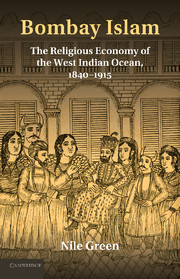Book contents
- Frontmatter
- Contents
- Illustrations
- Acknowledgements
- Maps
- Introduction
- 1 Missionaries and Reformists in the Market of Islams
- 2 Cosmopolitan Cults and the Economy of Miracles
- 3 The Enchantment of Industrial Communications
- 4 Exports for an Iranian Marketplace
- 5 The Making of a Neo-Ismā‘īlism
- 6 A Theology for the Mills and Dockyards
- 7 Bombay Islam in the Ocean's Southern City
- Conclusions
- Notes
- Bibliography
- Index
6 - A Theology for the Mills and Dockyards
Published online by Cambridge University Press: 03 May 2011
- Frontmatter
- Contents
- Illustrations
- Acknowledgements
- Maps
- Introduction
- 1 Missionaries and Reformists in the Market of Islams
- 2 Cosmopolitan Cults and the Economy of Miracles
- 3 The Enchantment of Industrial Communications
- 4 Exports for an Iranian Marketplace
- 5 The Making of a Neo-Ismā‘īlism
- 6 A Theology for the Mills and Dockyards
- 7 Bombay Islam in the Ocean's Southern City
- Conclusions
- Notes
- Bibliography
- Index
Summary
ON THE TRAIL OF THE MIGRANT WORKER
While the last two chapters examined the maritime dimensions of the religious economy by way of Iranian migration to Bombay, the following pages turn towards the religious entrepreneurs and consumers who entered the market from the city's continental hinterlands. An essential element of this pattern of demand and supply was the migrant Muslim workforce from Hyderabad and the Konkan who from the 1860s made up the largest proportion of the city's Muslim workforce. Working in Bombay's textile mills and dockyards, these migrants constituted the new social entity that was a Muslim industrial labour force. Through tracing the teachings of one of the religious ‘patrons’ of these workers and connecting his doctrines to the conditions of workers' lives, this chapter examines how, in a religious economy in which labourers formed an important part, the reproduction of custom acted as a successful response to the social change of industrialization. Bereft of the support networks of their village homes, and at the bottom of the social hierarchy of the industrial metropolis, migrant workers found themselves in greater need than ever of patrons and protectors. This socially driven demand in turn helped fuel a particular type of religious production by way of a theology and brotherhood of intercession that placed the miraculous powers of the holy man at the service of the uprooted labourers who pledged allegiance as his disciples.
- Type
- Chapter
- Information
- Bombay IslamThe Religious Economy of the West Indian Ocean, 1840–1915, pp. 179 - 207Publisher: Cambridge University PressPrint publication year: 2011



